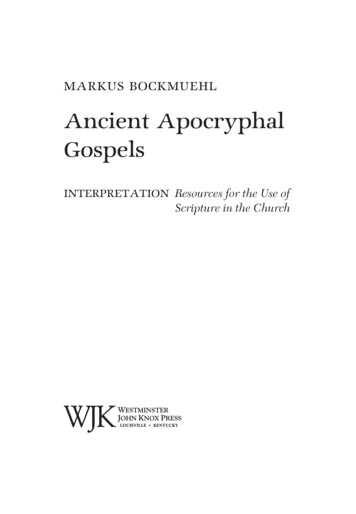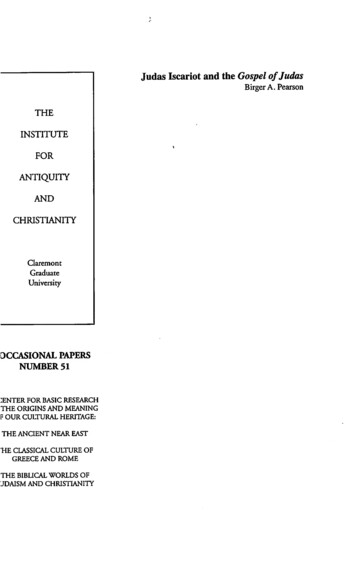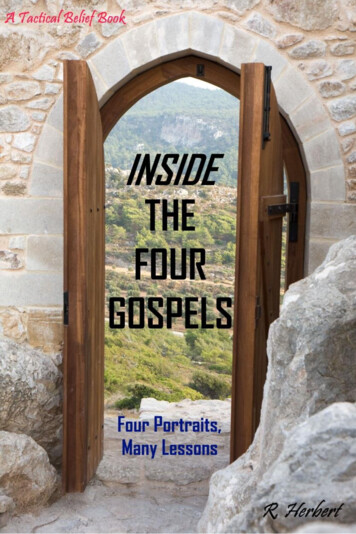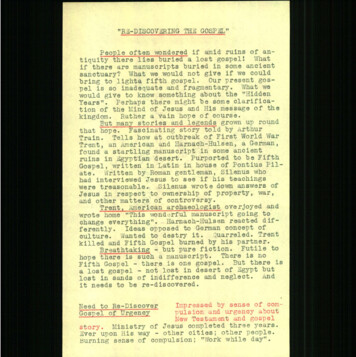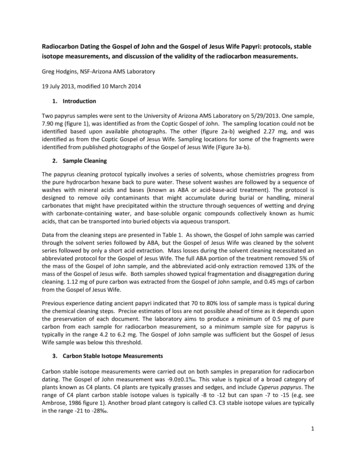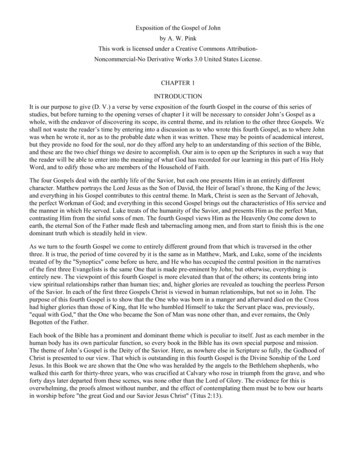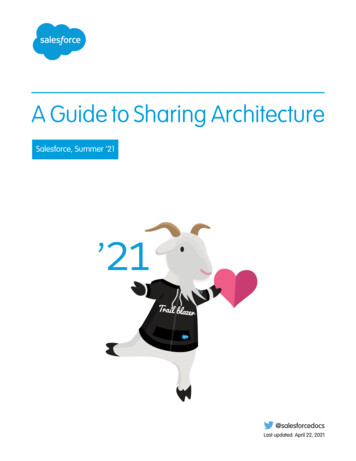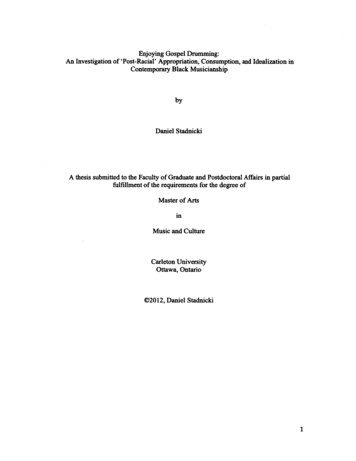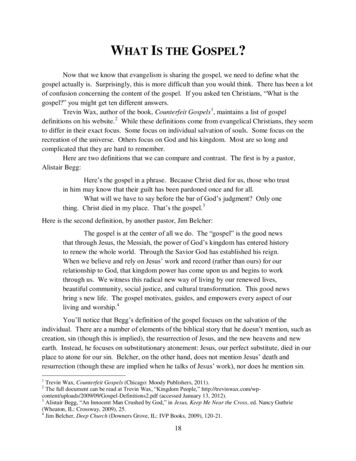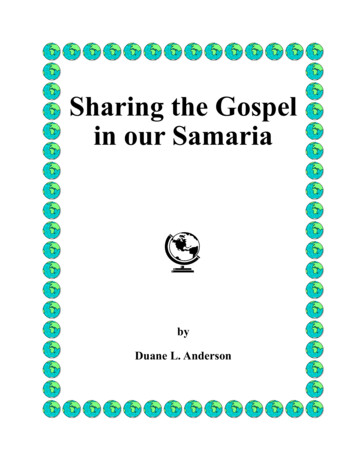
Transcription
Sharing the Gospelin our SamariabyDuane L. Anderson
Sharing the Gospelin our SamariaScripture quotations in this manual are from theNew King James version, 1979, 1980, 1982, Thomas Nelson, nc.American Indian Bible InstituteBox 511Norwalk, CA 90651-0511Copyright 1998, 2017, 2020 Duane L. Anderson, American Indian Bible InstituteThis resource is available free of charge from aibi.orgANY REPRODUCTION OF MATERIAL FOR RESALE OR PROFIT IS STRICTLY PROHIBITEDUpdated June 2020
Sharing the Gospel in our SamariaI.Are You a Philip or a Jonah?A.B.C.D.II.III.V.E.F.G.19Christ called the disciples to lift up their eyes and lookChrist showed how to make contacts in Samaria by exampleChrist provided bridges to cross-cultural barriersPractical Ways to Build Relationships in our ionCreationChrist’s Training Approach to Help us Share the Gospel in our SamariaA.B.C.6Jerusalem - the barrier of our own fearJudea - the barrier of making contactsSamaria - the barrier of another culture, religion or ethnic groupUttermost - the barrier of another languageUnderstanding Four C’s for EvangelismA.B.C.D.IV.Philip and Jonah were opposites (Jonah did not want the Lord to be gracious)Philip looked for opportunities to minister cross-culturallyPhilip yielded to the Holy Spirit in order to minister effectivelyPhilip ministered in love as he yielded to the Holy SpiritLearning How to Cross Barriers in EvangelismA.B.C.D.1Places to lift up our eyes and lookBuilding bridges to our SamariaMaking contacts in our SamariaSharing the Gospel in our Samaria1.the Holy Spirit opens doors through sharing common interests2.the Holy Spirit opens doors as we pray for their requests3.the Holy Spirit opens doors as we begin with the results of sin4.the Holy Spirit opens doors as we work with the Holy SpiritFollow-up of new Christians in our Samaria - spiritual parentingBuilding new Christians into a spiritual familyBuilding new Christians into the body24
I. Are You a Philip or a Jonah?In our Great Commission, in Matthew 28:19-20, we are commanded to MakeDisciples among all of the ethnic groups, “Go therefore and make disciples of all thenations, baptizing them in the name of the Father and of the Son and of the HolySpirit, teaching them to observe all things that I have commanded you; and lo, I amwith you always, even to the end of the age.’ Amen.” In this Commission, we have:One Command:make disciplesThree participles to carry out that commandgoingbaptizingteaching them to obeyAll ethnic groupsAll nations (ta ethne)In Acts 1:8, we see that this command is to be carried out in a progressiveorder. That verse tells us, “‘But you shall receive power when the Holy Spirit hascome upon you; and you shall be witnesses to Me in Jerusalem, and in all Judea andSamaria, and to the end of the earth.’” We can look at the four areas mentioned inthis verse in several different ways. One way that we can look at this verse is:our Jerusalem - people we know of our culturerelatives - John 1:41-42friends - John 1:43-46co-workers - Matthew 9:9-10neighbors - Mark 1:30-33our Judea - people we do not know of our cultureour Samaria - people of another culture, religion or ethnic groupour uttermost - people of another language1
A. Philip and Jonah were oppositesPhilip had love for his SamariaActs 8:4-8“Therefore those who were scattered went everywhere preaching the word. ThenPhilip went down to the city of Samaria and preached Christ to them. And themultitudes with one accord heeded the things spoken by Philip, hearing and seeingthe miracles which he did. For unclean spirits, crying with a loud voice, came out ofmany who were possessed; and many who were paralyzed and lame were healed.And there was great joy in that city.”Jonah had anger toward his SamariaJonah 4:1-4“But it displeased Jonah exceedingly, and he became angry. So he prayed to theLORD, and said, ‘Ah, LORD, was not this what I said when I was still in mycountry? Therefore I fled previously to Tarshish; for I know that You are a graciousand merciful God, slow to anger and abundant in lovingkindness, One who relentsfrom doing harm. Therefore now, O LORD, please take my life from me, for it isbetter for me to die than to live!’ Then the LORD said, ‘Is it right for you to beangry?’”If Jonah and Philip both lived in your neighborhood,Jonah would focus on:the people moving out of the neighborhoodthe problems because those people are no longer inyour churchPhilip would focus on:the people moving into the neighborhoodthe need of those people for salvationToday, as you look at your neighborhood,do you look with fearif you do, you will always see the problemsdo you look with loveif you do, you will always see the opportunitiesLift up your eyes and look! - John 4:352
B. Philip looked for opportunities to minister cross-culturallyPhilip saw the opportunity of the SamaritansActs 8:4-5“Therefore those who were scattered went everywhere preaching the word. ThenPhilip went down to the city of Samaria and preached Christ to them.”Philip saw the opportunity of an EthiopianActs 8:26-30“Now an angel of the Lord spoke to Philip, saying, ‘Arise and go toward the southalong the road which goes down from Jerusalem to Gaza.’ This is desert. So he aroseand went. And behold, a man of Ethiopia, a eunuch of great authority under Candacethe queen of the Ethiopians, who had charge of all her treasury, and had come toJerusalem to worship, was returning. And sitting in his chariot, he was reading Isaiahthe prophet. Then the Spirit said to Philip, ‘Go near and overtake this chariot.’ SoPhilip ran to him, and heard him reading the prophet Isaiah, and said, ‘Do youunderstand what you are reading?’”Philip saw the opportunity of outreach in CaesareaActs 8:40, 21:8“But Philip was found at Azotus. And passing through, he preached in all the citiestill he came to Caesarea.” “On the next day we who were Paul's companionsdeparted and came to Caesarea, and entered the house of Philip the evangelist, whowas one of the seven, and stayed with him.”Principles for cross-cultural ministry from the life of Philipyield to the Holy Spiritgo everywhere preaching the Wordsee the Samaritans as people needing Christshare the Gospel with the Samaritansbe sensitive to the needs of other groupsbe ready to help others understand the Biblebe ready to share with every culture3
C. Philip yielded to the Holy Spirit in order to minister effectivelyPhilip was led by the Holy SpiritActs 8:29-30“Then the Spirit said to Philip, ‘Go near and overtake this chariot.’ So Philip ran tohim, and heard him reading the prophet Isaiah, and said, ‘Do you understand whatyou are reading?’”Philip was led by the SpiritPhilip was obedient to the SpiritPhilip met a man prepared by the SpiritMany Christians try to minister in their own strengthWhen we minister in our own strength, we experience the same inner feelings Adamexperienced when he committed original sin.Genesis 3:7-13“Then the eyes of both of them were opened, and they knew that they were naked;and they sewed fig leaves together and made themselves coverings. And they heardthe sound of the LORD God walking in the garden in the cool of the day, and Adamand his wife hid themselves from the presence of the LORD God among the trees ofthe garden. Then the LORD God called to Adam and said to him, ‘Where are you?’So he said, ‘I heard Your voice in the garden, and I was afraid because I was naked;and I hid myself.’ And He said, ‘Who told you that you were naked? Have you eatenfrom the tree of which I commanded you that you should not eat?’ Then the mansaid, ‘The woman whom You gave to be with me, she gave me of the tree, and I ate.’And the LORD God said to the woman, ‘What is this you have done?’ The womansaid, ‘The serpent deceived me, and I ate.’”When we depend on our own strength,we experience the following results of sinwith Godseparation - John 15:5withinfear, guilt, shamewith othersblame4
D. Philip ministered in love as he yielded to the Holy SpiritWe will act out of fear when we depend on our own strengthWe will act out of love when we yield ourselves to GodRomans 7:14-25Romans 8:1-39bodybodysatisfy self by sinningserve one another in lovesoulsoulturn things in (hurt)turn things out (anger)turn things over(experience peace)spiritHoly Spiritdepend on myselfact out of fearyield my spiritact out of loveyield ourselves to sinmotivated by fearGenesis 3:7-13Our Choiceyield ourselves to Godmotivated by love2 Corinthians 5:14-171 John 4:18Romans 6:6, 11, 13, 16Ephesians 4:29-32Romans 12:17-21Modified Version of Fear or Love (page 1 of 1) Updated: January 2017Copyright 1998, 2017 Duane L. Anderson, American Indian Bible InstituteScripture taken from the New King James Version . Copyright 1982 by Thomas Nelson. Used by permission. All rights reserved.This resource is available free of charge from aibi.orgANY REPRODUCTION OF MATERIAL FOR RESALE OR PROFIT IS STRICTLY PROHIBITED5
II. Learning How to Cross Barriers in EvangelismAs we seek to share the Gospel with others, we see that we usually have tocross one or more barriers. In fact, the order of progression given in Acts 1:8 helpsus to understand the four most common barriers that we face in sharing the Gospel.That verse tells us, “But you shall receive power when the Holy Spirit has come uponyou; and you shall be witnesses to Me in Jerusalem, and in all Judea and Samaria,and to the end of the earth.”our Jerusalemour Judeaour Samariaour Uttermostpeople of our own culture that we already knowpeople of our own culture that we do not yet knowpeople of another culture, religion or ethnic grouppeople of another languageThe barriers that we experience in reaching these four groupsJerusalem - the barrier of our own fearJudea - the barrier of making contactsSamaria - the barrier of another culture, religion or ethnic grouputtermost - the barrier of languageMany times, people are afraid to witness due to the fact that they have never beenshown how to cross each barrier. Often, the approach that most churches use to focuson evangelism forces people to try and cross several barriers at one time. Christ gaveus a Biblical pattern for teaching people how to cross each barrier. If we understandand use that Biblical pattern for our own ministry of evangelism, we will becomeeffective in our Samaria. In addition, we will also know how to train others foreffective evangelism in their Samaria.The first key principle that Christ taught about evangelism was the importanceof showing people how to share the Gospel instead of just telling them. In Matthew4:19 Christ said:“Follow Me, and I will make you fishers of men.”6
A. Jerusalem - the barrier of our own fearWe see the barrier of fear demonstrated by PeterJohn 18:17, 25-27“Then the servant girl who kept the door said to Peter, ‘You are not also one of thisMan's disciples, are you?’ He said, ‘I am not.’.Now Simon Peter stood and warmedhimself. Therefore they said to him, ‘You are not also one of His disciples, are you?’He denied it and said, ‘I am not!’ One of the servants of the high priest, a relative ofhim whose ear Peter cut off, said, ‘Did I not see you in the garden with Him?’ Peterthen denied again; and immediately a rooster crowed.”We see why Christ said we have this barrierJohn 15:5“‘I am the vine, you are the branches. He who abides in Me, and I in him, bears muchfruit; for without Me you can do nothing.’”We see how Christ said we must cross this barrierLuke 24:48-49“‘And you are witnesses of these things. Behold, I send the Promise of My Fatherupon you; but tarry in the city of Jerusalem until you are endued with power from onhigh.’”We see what happened when Peter and John depended on the Holy SpiritActs 4:13“Now when they saw the boldness of Peter and John, and perceived that they wereuneducated and untrained men, they marveled. And they realized that they had beenwith Jesus.”We see the source of this boldnessActs 4:23-24a, 29-31“And being let go, they went to their own companions and reported all that the chiefpriests and elders had said to them. So when they heard that, they raised their voiceto God with one accord and said: ‘Now, Lord, look on their threats, and grant toYour servants that with all boldness they may speak Your word, by stretching outYour hand to heal, and that signs and wonders may be done through the name ofYour holy Servant Jesus.’ And when they had prayed, the place where they wereassembled together was shaken; and they were all filled with the Holy Spirit, andthey spoke the word of God with boldness.”we will be fearful when we speak in our own strengthwe will speak the Word with boldness when we are filled with the Holy Spirit7
The way the twelve learned to share the Good News about ChristThey began by learning to share the Good News with their relativesJohn 1:41-42a“He first found his own brother Simon, and said to him, ‘We have found theMessiah’ (which is translated, the Christ). And he brought him to Jesus.”42They shared the Good News with their friendsJohn 1:45-46“Philip found Nathanael and said to him, ‘We have found Him of whom Moses in thelaw, and also the prophets, wrote -- Jesus of Nazareth, the son of Joseph.’ AndNathanael said to him, ‘Can anything good come out of Nazareth?’ Philip said tohim, ‘Come and see.’’They shared the Good News with their co-workersMatthew 9:9-10“As Jesus passed on from there, He saw a man named Matthew sitting at the taxoffice. And He said to him, ‘Follow Me.’ So he arose and followed Him. Now ithappened, as Jesus sat at the table in the house, that behold, many tax collectors andsinners came and sat down with Him and His disciples.”They shared the Good News with their neighborsMark 1:30-33“But Simon's wife's mother lay sick with a fever, and they told Him about her atonce. So He came and took her by the hand and lifted her up, and immediately thefever left her. And she served them. At evening, when the sun had set, they broughtto Him all who were sick and those who were demon-possessed. And the whole citywas gathered together at the door.”We learn to share the Gospel most easily if we only cross one barrier at a time.The twelve give us the example that we need to begin with:our relativesour friendsour co-workersour neighborsThe next two pages give an outline that can be used with new Christians to helpthem begin praying for relatives, friends, co-workers and neighbors.8
Driven by Fear or Led by Love2 Timothy 1:7For God has not given us a spirit of fear, but of power and of love and of a sound mind.1.2.3.4.When we are driven by fear:We are experiencing the results of Adam’s fall - Genesis 3:7-13We will fear people instead of fearing God - Romans 3:18We will focus on the law (or man’s rules - Romans 3:19-20) when we are nolonger under the law - Galatians 3:24-25We will serve out of fear instead of love - 2 Timothy 1:72 Corinthians 5:14-15For the love of Christ compels us, because we judge thus: that if One died for all, then alldied; and He died for all, that those who live should live no longer for themselves, but forHim who died for them and rose again.1.2.3.4.5.6.7.8.When we are led by love:We no longer live for ourselves - 2 Corinthians 5:15We no longer regard people according to the flesh - 2 Corinthians 5:16We realize that we are new creations - 2 Corinthians 5:17We realize that we have been given the ministry of reconciliation 2 Corinthians 5:18We realize we have been given the word of reconciliation - 2 Corinthians 5:19We realize that we are ambassadors for Christ - 2 Corinthians 5:20We realize that we have received the righteousness of God in Christ 2 Corinthians 5:21We pray for boldness to speak the Word of God - Acts 4:13, 29-31; Ephesians6:19-20; Philippians 1:20I.We will pray and share the Good News of Christ with our relativesHe first found his own brother.and he brought him to Jesus. - John 1:41-421.2.3.4.5.6.7.8.Started Praying for:Prayer Answered:Love Motivates (page 1 of 2) Updated: March 2017Copyright 1999, 2017 Duane L. Anderson, American Indian Bible InstituteScripture taken from the New King James Version . Copyright 1982 by Thomas Nelson. Used by permission. All rights reserved.This resource is available free of charge from aibi.orgANY REPRODUCTION OF MATERIAL FOR RESALE OR PROFIT IS STRICTLY PROHIBITED9
II.We will pray and share the Good News of Christ with our friendsPhilip found Nathanael and said to him, “We have found Him of whom Moses in the law,and also the prophets, wrote—Jesus of Nazareth, the Son of Joseph.”.Philip said to him,“Come and see.” - John 1:45-46Started Praying for:Prayer answered:1.2.3.4.5.6.7.8.III. We will pray and share the Good News of Christ with our co-workersAs Jesus passed on from there, He saw a man named Matthew sitting at the tax office. AndHe said to him, “Follow me.” .Now it happened, as Jesus sat at the table in the house, thatbehold, many tax collectors and sinners came and sat down with Him and His disciples. Matthew 9:9-10Started Praying for:Prayer answered:1.2.3.4.5.6.7.8.IV. We will pray and share the Good News of Christ with our neighborsNow as soon as they had come out of the synagogue, they entered the house of Simon andAndrew, with James and John.And the whole city was gathered together at the door. Mark 1:29-33Started Praying for:Prayer answered:1.2.3.4.5.6.7.8.Love Motivates (page 2 of 2) Updated: March 2017Copyright 1999, 2017 Duane L. Anderson, American Indian Bible InstituteScripture taken from the New King James Version . Copyright 1982 by Thomas Nelson. Used by permission. All rights reserved.This resource is available free of charge from aibi.orgANY REPRODUCTION OF MATERIAL FOR RESALE OR PROFIT IS STRICTLY PROHIBITED10
B. Judea - the barrier of making contactsWe see the way Christ taught the twelve to cross barriersMatthew 10:5-6“These twelve Jesus sent out and commanded them, saying: ‘Do not go into the wayof the Gentiles, and do not enter a city of the Samaritans. But go rather to the lostsheep of the house of Israel.’”the twelve were not to cross the barrier of language - Gentilesthe twelve were not to cross the barrier of another culture,religion or ethnic group - Samaritansthe twelve were to cross the barrier of making contacts - JewsWe see the way Christ taught the twelve to make contactsMatthew 10:7-12“And as you go, preach, saying, ‘The kingdom of heaven is at hand. Heal the sick,cleanse the lepers, raise the dead, cast out demons. Freely you have received, freelygive. Provide neither gold nor silver nor copper in your money belts, nor bag for yourjourney, nor two tunics, nor sandals, nor staffs; for a worker is worthy of his food.Now whatever city or town you enter, inquire who in it is worthy, and stay there tillyou go out. And when you go into a household, greet it.’”1the twelve were given a message to sharethe twelve were to be sensitive to physical and spiritual needsthe twelve were to give freely just as they had received freelythe twelve were not to depend on their own effortsthe twelve were to find out who was respectedthe twelve were to greet those that they visitedWe see the way Christ reviewed what had happened as they made contactsMark 6:30-31a“Then the apostles gathered to Jesus and told Him all things, both what they haddone and what they had taught. And He said to them, ‘Come aside by yourselves to adeserted place and rest a while.’”the twelve told what they had donethe twelve told what they had taughtthe twelve spent time resting and reviewing11
C. Samaria - the barrier of another culture, religion or ethnic groupThe disciples had to begin to see the SamaritansJohn 4:35“Do you not say, 'There are still four months and then comes the harvest? Behold, Isay to you, lift up your eyes and look at the fields, for they are already white forharvest!’”the disciples had to lift up their eyesthe disciples had to see the other cultures around themthe disciples had to see the other cultures as people to be reachedThe disciples had to begin to see that Samaritans were open to the GospelJohn 4:39-41“And many of the Samaritans of that city believed in Him because of the word of thewoman who testified, ‘He told me all that I ever did.’ So when the Samaritans hadcome to Him, they urged Him to stay with them; and He stayed there two days. Andmany more believed because of His own word.”the Samaritans were open to listen to the womanthe Samaritans wanted to learn more about Christthe Samaritans urged Christ to spend time with themthe Samaritans believed as they learned from Christthe disciples saw the openness of the SamaritansThe disciples had to change their attitudes toward the SamaritansLuke 9:51-56“Now it came to pass, when the time had come for Him to be received up, that Hesteadfastly set His face to go to Jerusalem, and sent messengers before His face. Andas they went, they entered a village of the Samaritans, to prepare for Him. But theydid not receive Him, because His face was set for the journey to Jerusalem. Andwhen His disciples James and John saw this, they said, ‘Lord, do You want us tocommand fire to come down from heaven and consume them, just as Elijah did?’ ButHe turned and rebuked them, and said, ‘You do not know what manner of spirit youare of. For the Son of Man did not come to destroy men's lives but to save them.’And they went to another village.”the disciples had to understand their own spirit (prejudices)the disciples had to see that Christ came to save all cultures12
D. Uttermost - the barrier of another languageThe barrier of another language illustratedActs 14:11-18“Now when the people saw what Paul had done, they raised their voices, saying inthe Lycaonian language, ‘The gods have come down to us in the likeness of men!’And Barnabas they called Zeus, and Paul, Hermes, because he was the chief speaker.Then the priest of Zeus, whose temple was in front of their city, brought oxen andgarlands to the gates, intending to sacrifice with the multitudes. But when theapostles Barnabas and Paul heard this, they tore their clothes and ran in among themultitude, crying out and saying, ‘Men, why are you doing these things? We also aremen with the same nature as you, and preach to you that you should turn from theseuseless things to the living God, who made the heaven, the earth, the sea, and allthings that are in them, who in bygone generations allowed all nations to walk intheir own ways. Nevertheless He did not leave Himself without witness, in that Hedid good, gave us rain from heaven and fruitful seasons, filling our hearts with foodand gladness.’ And with these sayings they could scarcely restrain the multitudesfrom sacrificing to them.”Paul and Barnabas did not understand the languagePaul did not know that they were misunderstoodPaul observed the actions of the peoplePaul explained they had the same human naturePaul used the opportunity to present the living God as CreatorPaul showed how people in the past had walked in their own waysPaul said that the creation pointed to the CreatorPractical ways to cross the language barrierbe friendly as you meet people of other languagesfind out which members of the family speak some Englishbuild bridges to those who speak some Englishfind out the primary language of the familyget a Bible in the language of the family if possiblein most cultures, speak to the senior adult even if through an interpreteroffer help to learn English for those who desire helpuse Bibles in both languages to help teach Englishask them to help you memorize verses in their languagetake time to discuss the verses they are helping you memorizebegin a Bible study using both languages13
III. Understanding Four C’s for EvangelismAs we go through the New Testament, we see that Christ and the disciplesused many different approaches to share with others. Four of the key ways that theGospel was shared in the New Testament are:ConfrontationClarificationCompassionCreationIn order to share the Gospel effectively in our Samaria, it is helpful tounderstand these four approaches. That makes it possible for us to know what waymay be the most effective way to share the Gospel with each individual of anotherculture. That will help us to build bridges to other cultures rather than barricades.Confrontation was used in the New Testament in some casesJohn 3:3“Jesus answered and said to him, ‘Most assuredly, I say to you, unless one is bornagain, he cannot see the kingdom of God.’”Clarification was used in the New Testament in some casesActs 17:11-12“These were more fair-minded than those in Thessalonica, in that they received theword with all readiness, and searched the Scriptures daily to find out whether thesethings were so. Therefore many of them believed, and also not a few of the Greeks,prominent women as well as men.”Compassion was used in the New Testament in some casesJohn 4:7“A woman of Samaria came to draw water. Jesus said to her, ‘Give Me a drink.’”Creation was used in the New Testament in some casesActs 17:23-24“For as I was passing through and considering the objects of your worship, I evenfound an altar with this inscription: TO THE UNKNOWN GOD. Therefore, the Onewhom you worship without knowing, Him I proclaim to you: God, who made theworld and everything in it, since He is Lord of heaven and earth, does not dwell intemples made with hands.”14
A. ConfrontationThese individuals are church attendees who are depending on their own effortsUsing confrontation to share the GospelIllustrated with Nicodemus - John 3:1-21(he had depended on religious involvement)confront with Scripture - John 3:14-15confront with love - John 3:16-17confront by pointing out choices and consequences - John 3:16-21Illustrated by the rich young ruler Luke 18:18-27; Mark 10:17-22; Matthew 19:16-26confront with Scripture - Luke 18:19-20confront with love - Mark 10:21confront by pointing out choices and consequences - Matthew 19:21Confrontationis necessary when we are talking to church attendees who are dependingon their religious involvement or their own good workswas used by Christ primarily with religious leaders like the scribes,Pharisees and Sadduceeswas used by Christ with those who were depending on their own effortsto be right with God by trying to keep the lawKnowing what approach to useuse confrontationwith church attendees who are depending on their own effortsuse clarificationwith people who are interested but have neverunderstood the meaning of repentance and faithuse compassionwith people who feel they are “too bad” to be accepted by Goduse creationwith people who have no background of the Bible15
B. ClarificationThese individuals are interested church attendees who have never understoodthe meaning of repentance and faith -Acts 20:21; 1 Thessalonians 1:9-10Using clarification to share the GospelIllustrated by Philip in Acts 8:26-40listen to find out what the person understands - Acts 8:30-31be available to explain what is not clear - Acts 8:31, 35use the Scripture - Acts 8:32-33, 35listen to see what the person does not understand - Acts 8:34focus on Christ and what He has done - Acts 8:35make certain the person clearly understands - Acts 8:36-37Illustrated by Paul in Acts 17:11-12share the Word of Godencourage the people to study the Word for themselvestake time to study the Scriptures with themboth speak and listenIllustrated by Aquila and Priscilla in Acts 18:24-26they invited Apollos to their homethey explained the Gospel more clearlyApplied to our own livesexplain the Word of God - Acts 17:11, 18:26encourage group Bible study - Acts 17:11take time to study with them - Acts 17:11, 18:26listen to the things they understand - Acts 8:30-31listen to the things they do not understand - Acts 8:34focus on Christ and what He has done - Acts 8:35use your home for personal one-to-one studies - Acts 18:2616
C. CompassionThese individuals feel I am “too bad” to be accepted by GodUsing compassion to share the GospelIllustrated with Matthew - Matthew 9:9-13(he had rejected the acceptable standards of culture and religion)go to people where they live, work and spend their free time - Matthew 9:9-10accept people as they are and invite them to follow Christ - Matthew 9:9eat meals with those who need compassion - Matthew 9:10accept the friends of those with whom you come in contact - Matthew 9:10accept criticism from the religious - Matthew 9:11choose to show mercy - Matthew 9:12Illustrated with the Prodigal Son - Luke 15:11-24(he had lived a wild life)accept the right of people to make wrong choices - Luke 15:12have compassion and show it - Luke 15:20accept people as they are - Luke 15:20forgive (let go) of the sins of people - Luke 15:21-24explain how Christ makes us worthy - Luke 15:21; 2 Timothy 2:21explain how God accepted the righteousness of Christ - Luke 15:22;2 Corinthians 5:21Explain how Christ accepts us as sons - Luke 15:22, 24; John 1:12Celebrate the salvation of new Christians - Luke 15:6-7, 9-10, 23-24Illustrated with the Samaritan woman - John 4:1-42(she had grown up in a different religion and culture and had lived a sinful life)accept people as they are - John 4:7accept rejection and distrust - John 4:9-10develop curiosity - John 4:10offer everlasting life - John 4:14don’t get sidetracked by questions about religion - John 4:19-21focus on the meaning of true worship - John 4:22-24introduce people to Christ - John 4:25-26use the opportunity to train those with you - John 4:31-38focus on reaching the extended family and community - John 4:39-4217
D. CreationThese individuals are the people who have no background of the BibleIllustrated by the people of Athens - Acts 17:16-34Characteristics of the people of Athensthe people were given to idol worship - Acts 17:16the people gathered daily in the marketplace - Acts 17:17the people had no understanding of Paul’s message - Acts 17:18the people wanted to learn about Paul’s message - Acts 17:19-20the people enjoyed em
Sharing the Gospel in our Samaria I. Are You a Philip or a Jonah? 1 A. Philip and Jonah were opposites (Jonah did not want the Lord to be gracious) B. Philip looked for opportunities to minister cross-culturally C. Philip yielded to the Holy Spirit in order to minister effectively D. Philip

